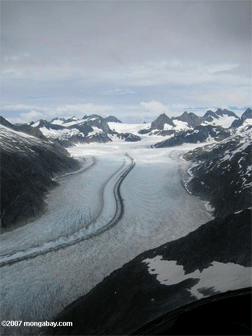Sea levels may rise 2-3 times faster than expected
Sea levels may rise 2-3 times faster than expected
mongabay.com
August 31, 2008
Global sea level rise this century from a melting Greenland ice sheet may be two to three times greater than current estimates warn researchers writing in journal Nature Geoscience.
Analyzing geologic data and computer models to reconstruct the melting of the Laurentide Ice Sheet, a land-based ice mass that covered much of North America, 9,000 to 6,500 years ago, Anders Carlson and colleagues found that ice sheet melt can occur quite rapidly.
“We have never seen an ice sheet retreat significantly or even disappear before, yet this may happen for the Greenland Ice Sheet in the coming centuries to millennia,” said Anders Carlson, the study’s lead author and assistant professor of geology and geophysics at the University of Wisconsin-Madison. “What we don’t know is the rate of melting of the Greenland Ice Sheet. The geologic data we compiled on the retreat history of the Laurentide Ice Sheet, however, gives us a window into how fast these large blocks of ice can melt and raise sea level.”

|
Laurentide had two intervals of rapid melting, the first around 9,000 years ago, and the second 7,500 years ago. The study estimates that during the first phase, melting led to about approximately 7 meters of sea level rise at about 1.3 cm a year. The second phase accounted for around 5 meters of sea level rise at about 1.0 cm a year.
“This finding shows the potential for ice to disappear quickly, given the right push,” said Allegra LeGrande, a research scientist at the NASA Goddard Institute for Space Studies and the Center for Climate Systems Research at Columbia University who led the computer modeling from the study.
The findings suggest that Intergovernmental Panel on Climate Change (IPCC) projections for changes in sea level for the next century may be too low. The IPCC’s estimates of 1 to 4 inches of sea level rise over the next century are based largely on the thermal expansion of seawater due to warming.
“For planning purposes, we should see the IPCC projections as conservative,” said Carlson. “We think this is a very low estimate of what the Greenland ice sheet will contribute to sea level.”
“The word ‘glacial’ used to imply that something was very slow,” said LeGrande. “This new evidence compiled from the past paired with our model for predicting future climate indicates that ‘glacial’ is anything but slow. Past ice sheets responded quickly to a changing climate, hinting at the potential for a similar response in the future.”
The research indicates that a rise of 1 to 2 feet over the course of a century is possible. Higher sea levels would put low-lying cities such as New Orleans and Miami at greater risk from hurricanes and storm surge. Island nations in the Indian Ocean and South Pacific could be swamped by rising seas.
Carlson, A.E. et all (2008). Rapid early Holocene deglaciation of the Laurentide ice sheet. Nature Geoscience 31 August 2008; doi:10.1038/ngeo285







